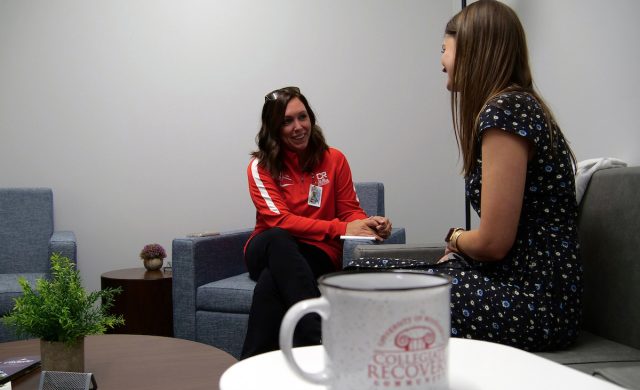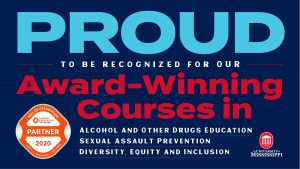
Erin Cromeans (left), UM assistant director of wellness education, talks with an Ole Miss student. The university has been awarded the Campus Prevention Network Seal of Prevention, which recognizes the university’s commitment to safety, wellness and inclusion. The William Magee Center for Wellness Education is among the resources that UM offers to help students face tough challenges. Photo courtesy University Development
OXFORD, Miss. – The University of Mississippi has been awarded the Campus Prevention Network Seal of Prevention, which recognizes the university’s commitment to safety, wellness and inclusion through a variety of digital prevention programs.
The award was given by Everfi, a company that helps UM offer training modules for students. It is a testament to the digital prevention programs offered across campus, such as those that students participate in upon enrollment in the university.
What began as an online alcohol education course has evolved into a more robust program for helping students face tough challenges. It is aimed at educating students when they arrive at the university so that when they’re faced with tough decisions around alcohol, drugs, sex, inclusion and equity, they have an understanding of the issues and know what resources are available to them on campus.
“No student is ever ready for that first conversation – a peer in need because they’re using substances to cope or seeing a potential assault situation happening,” said Erin Murphy Cromeans, assistant director of wellness education. “I don’t think any student is ready for that initial feeling in their gut telling them to step in.
“But over time, they will feel comfortable stepping in, and that’s why we have these conversations and multiple touch points in their first two years.”
Most Ole Miss students will complete the alcohol and sexual assault prevention education courses as freshmen. Last year, an additional educational module – diversity, equity and inclusion – was implemented in Greek organizations and First Year Experience classes.
 The program really begins to take root in First Year Experience classrooms, residence halls and in sororities and fraternities, once the modules are completed and the conversations begin, said Cromeans, who joined the Office of Health Promotion as a graduate student when the university first implemented the alcohol education module 13 years ago.
The program really begins to take root in First Year Experience classrooms, residence halls and in sororities and fraternities, once the modules are completed and the conversations begin, said Cromeans, who joined the Office of Health Promotion as a graduate student when the university first implemented the alcohol education module 13 years ago.
The learning modules also teach students about resources available to them and their peers, such as UMatter, Violence Intervention and Prevention Services, the William Magee Center for Wellness Education, and the Division of Diversity and Community Engagement.
Shelli Poole, assistant director for violence intervention and prevention, said many of the first-year students who come to her office haven’t been taught about consent.
“We need to teach students how to talk about consent, and also how to talk about consent around drug and alcohol use,” Poole said. “Even more than that, what does a healthy relationship look like and what does consent look like with different power dynamics on and off campus?”
Cromeans referred to the first six weeks a student is on campus as the red zone – the time when they’re most easily influenced and when they’re developing their new communities. It’s an overwhelming time for new students, too.
That’s why it’s important to plant the seed of education when students arrive, so that it will serve as a catalyst and a common experience for important conversations down the road, and ultimately help students make healthy decisions, she said.
JuWan Robinson, project manager for diversity education and strategic initiatives, led the development of UM’s diversity, equity and inclusion course. The learning module is focused on creating an equitable learning environment on campus, but also preparing students for their academic and professional futures, he said.
“We have a responsibility as a university to prepare our students for every potential opportunity within and beyond this campus,” Robinson said. “As students go on to employers, graduate school or wherever in the world, they’re going to be required to engage positively with people who are different than them.
“We know corporations with more diverse leadership and workforces have better results and outcomes. We want students to be able to be a part of that – to be able to learn and engage across differences in a positive way.”